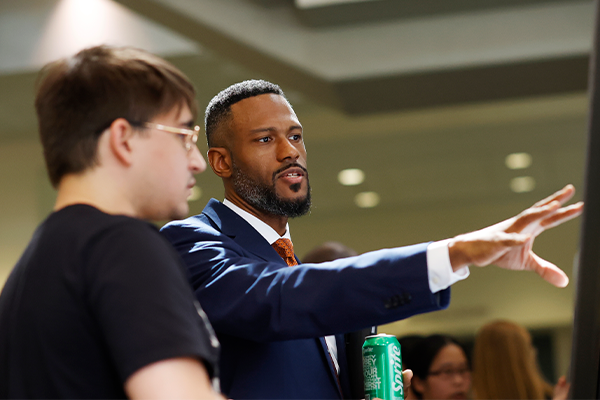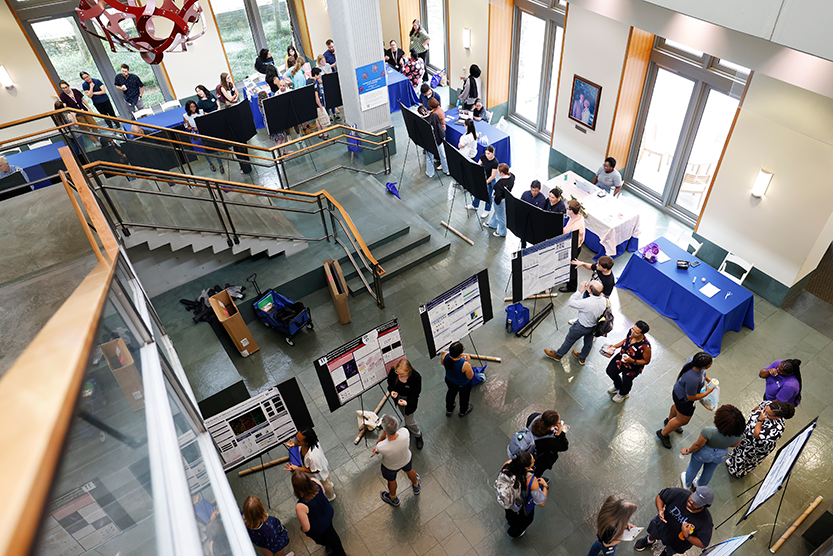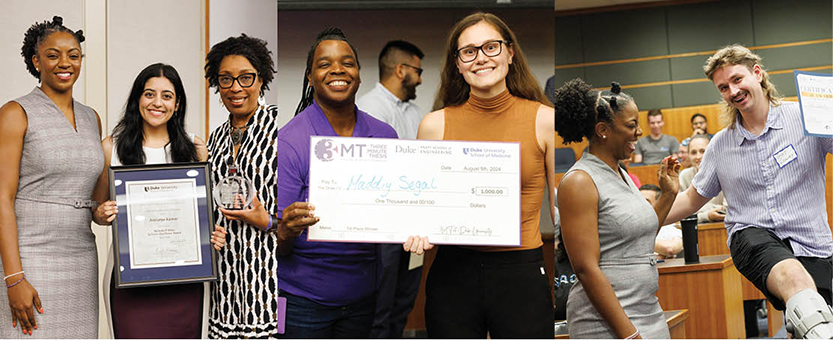
Faculty, students, and staff from across Duke came together for conversations on creating an inclusive culture within scientific fields at Duke University School of Medicine’s second annual Equity Advancement Symposium on August 5. The daylong event was sponsored by the School of Medicine IDEALS Office and the Office of Equity, Diversity and Inclusion.
Marcus Lambert, PhD, of SUNY Downstate Health Sciences University, delivered the keynote address on “Unraveling the Paradox: Why STEM Innovation Fails to Address Its Own Diversity Crisis.” His talk explored the lack of diversity in STEM (Science, Technology, Engineering, and Mathematics) and offered possible solutions.
Lambert, associate vice president for research strategy and operations at Downstate, shared research from his own team and from other institutions that examines the lack of diversity in the STEM workforce and educational system. He emphasized that the long-term outlook for diversity in the STEM workforce is closely tied to representation in the STEM educational system.
While there appears to have been some progress made in increasing representation among STEM degree recipients, Lambert said this doesn’t tell the full story. Not all groups are advancing at the same rate. His research team predicts that in 20 years, certain groups may begin to fare worse. For instance, the proportion of Black female STEM undergraduate degree recipients could decrease at an alarming rate over the next two decades.
When there is a lack of diversity, innovation suffers, Lambert said. Although research has shown that socially diverse groups are more innovative than homogeneous groups, according to Lambert, a paradox exists. Diversity in the scientific workforce fuels innovation, yet there is a lack of diversity at many levels. Even when members of underrepresented groups make innovative contributions, Lambert said those contributions are often systematically undervalued and discounted.

“If we don’t identify and address systemic career barriers, we risk losing talent and innovation,” he said.
Mentorship networks can help address the problem. Instead of focusing on traditional one-on-one relationships between mentors and mentees, Lambert said creating mentorship networks that include multiple mentors — such as a research mentor, peer mentor, coach, and sponsor — is a better approach toward eliminating some of the career barriers faced by various groups.
In addition to Lambert’s talk, the symposium also featured updates from several departments and presentations of student and trainee research. Multiple departmental presenters shared examples of their units’ efforts to create a culture of inclusion and respect for all at Duke and in the local community.
David Martinez, PhD, the BioCoRE alumni speaker, offered advice to current students and postdocs. He was a member of the first cohort of the BioCoRE program and is currently an assistant professor of immunobiology at Yale School of Medicine. BioCoRE, which is open to graduate students, promotes the holistic development of scholars throughout their PhD training within the School of Medicine.
The day offered graduate students and trainees an opportunity to spotlight their health equity-focused research. Graduate students gave flashtalks on proposals to increase equity in STEM, and current trainees presented posters on their biomedical research. During a three-minute thesis competition, nine PhD students from the School of Medicine and Pratt School of Engineering were given three minutes to present their research for a lay audience. The winners of the competition were awarded cash prizes.
The symposium concluded with an awards ceremony recognizing the recipients of the Michelle P. Winn Inclusive Excellence Award. New BioCoRE and PRIME-PREP scholars for the 2024-2025 academic year were also introduced.
During the ceremony, awards were given for the best poster presentations. The winners were:
- Gus Lowry, Biochemistry PhD student
- Erin Dickert, Cell and Molecular Biology graduate student
- Tiyanni Jones, Duke Cell Biology Academy high school student
The winners of the Three-Minute Thesis competition were:
- First Place ($1,000 prize) - Maddiy Segal, Mechanical Engineering and Materials Science
- Second Place ($750 prize) - Amit Narawane, Biomedical Engineering
- People’s Choice ($500 prize) - Hillel Price, Biomedical Engineering

Center: Maddiy Segal, Mechanical Engineering and Materials Science student, right, accepts the top prize in the Three Minute Thesis competition from Debra Ragland, PhD, Director, BioCoRE Program.
Right: Gus Lowry, Biochemistry PhD student, reacts as he accepts the first place award for his research poster from Johnna Frierson, PhD.